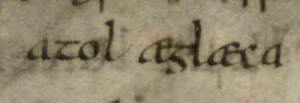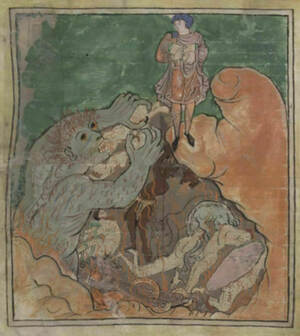From the Medieval Research Blog: "Aglæca: Awesome Opponent or Uncanny Invader?"

One of the most challenging Old English terms to translate is the enigmatic aglæca, a term that has prompted an extensive amount of ink spilled. Earlier translators tended to gloss the term as “monster,” a definition that applies to the most frequent usage in the corpus. In this vein, J.R. Clark Hall’s Concise Anglo-Saxon Dictionary defines aglæca (m.) as “wretch, monster, demon, fierce enemy” and the related term, aglæc (n.) as “trouble, distress, oppression, misery, grief” (15). Similarly, Bosworth Toller’s Anglo-Saxon Dictionary offers these six definitions for aglæca (n.): “A miserable being, wretch, miscreant, monster, fierce combatant.” These foundational sources substantiate the many translations that render the term as “monster,” albeit with neutral exceptions such as “fierce combatant” when referring to positive figures and heroes.

Recent critical editions, however, reflect a different trajectory. These editions shift to something more akin to “fierce combatant” than “monster.” For example, in Beowulf: A Critical Edition, edited by Bruce Mitchell and Fred Robinson, the term appears as “fierce combatant, adversary” (241). Similarly, Klaeber’s Beowulf: Fourth Edition, edited by R.D. Fulk, Robert Bjork and John Niles, glosses aglæca (m.) as “one inspiring awe or misery, formidable one, afflicter, assailant, adversary, combatant” (347). Lastly, the University of Toronto’s Dictionary of Old English [DOE] adheres to this trend, in glossing the term as “awesome opponent, ferocious fighter.” None of these more recent editions include “monster” or “wretch” as definitions for the term, nor do any related terms such as “demon” or “miscreant” that carry an unequivocally pejorative sense.
The new convention attempts to solve a longstanding problem associated with Beowulf. In that poem, references to both monsters and heroes provoked a blatant inconsistency, which glossed negatively in referencing the monsters and positively in referencing the heroes. The proposed solution to this inconsistency was located in a reference to Bede as the aglæca lareow “aglæca teacher, master, preacher.” Given Bede’s renowned for learned equanimity, it was reasoned that the term could not denote a pejorative meaning. Accordingly, the now conventional glosses, “awesome opponent, ferocious fighter” applied equally to demonic monsters (Satan in Juliana and Grendel in Beowulf), heroic warriors (Beowulf and Sigemund in Beowulf), missionary saints ( St. Andrew in Andreas) and the venerable scholar (Bede in the prose text, Byrhtferth’s Manual).
This is an excerpt from "Aglæca: Awesome Opponent or Uncanny Invader?" by Drs. Chris Vinsonhaler & Richard Fahey. Read the full story.